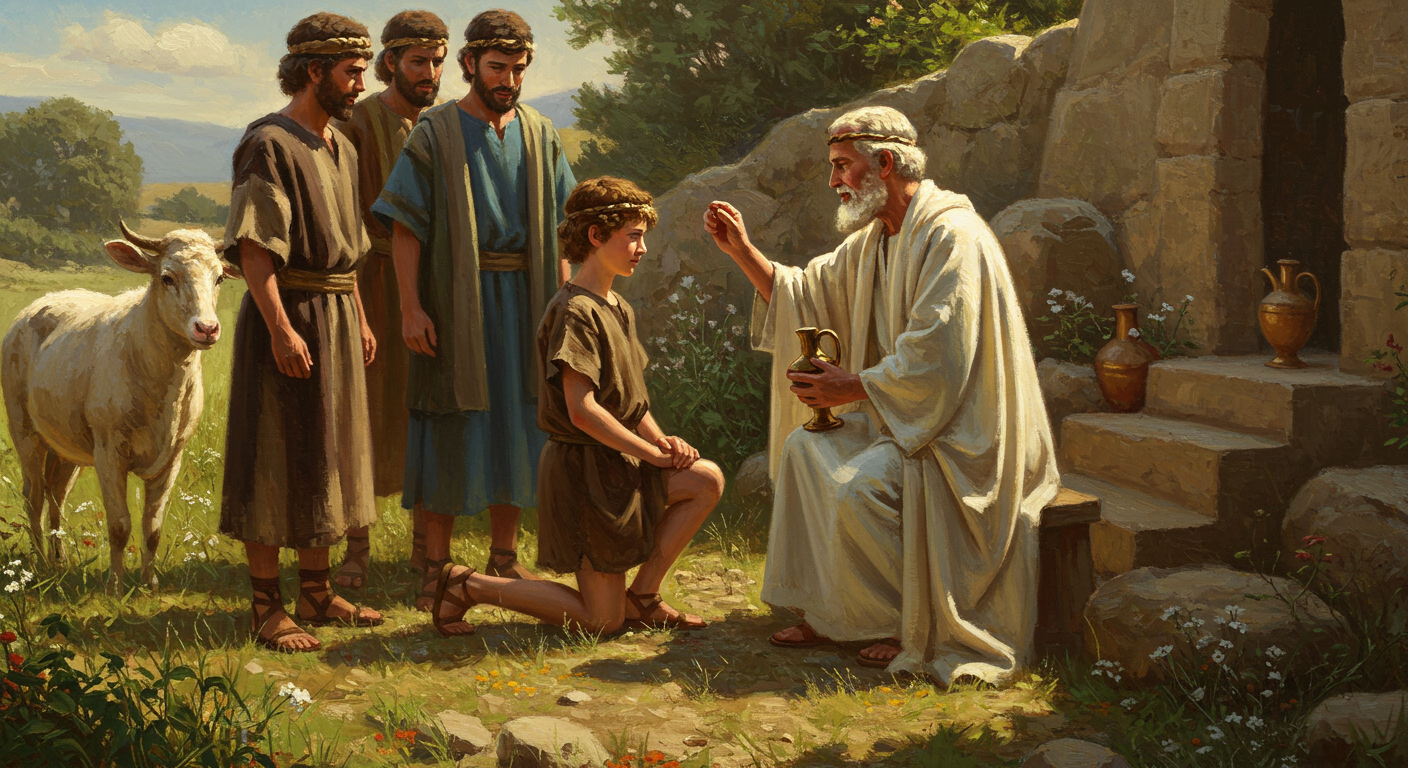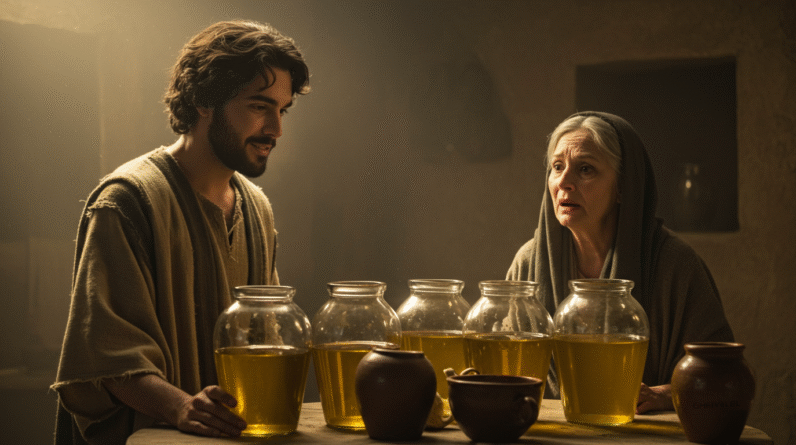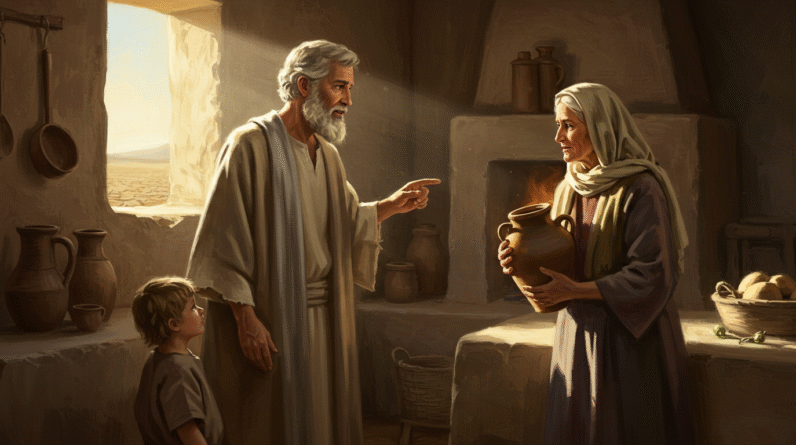Samuel Anoints David: Choosing A King After God’s Heart
There’s something extraordinary about the way certain stories from the past still speak powerfully to us today. They stir our imaginations, touch our hearts, and invite us to see the world in a new light. The story of how Samuel anoints David, a humble shepherd, to become king of Israel is one of those incredible narratives. It’s a tale that has been passed down through generations—one that teaches us about the importance of character and integrity. It shows us what truly matters when it comes to leadership: not wealth, stature, or appearances, but the condition of one’s heart.
The Scene: A Kingdom in Discontent
Imagine this: the Israelites wanted a king. They wanted to be like other nations, to have a leader they could follow into battle, a ruler to govern them with might and authority. Enter Saul, the first king. On paper, Saul seemed perfect: tall, strong, and striking. But appearances, as they often can be, were deceiving. Saul’s reign turned tumultuous, marked by disobedience to God and impulsive actions that led to divine rejection.
In this setting of discontent and divine disappointment, we find the prophet Samuel caught in a whirl of emotions. Samuel had hopes for Saul. Yet, God urged Samuel to move on, to listen. It was time for a new chapter, a fresh breath of leadership. Thus, began the journey of choosing someone who would lead not just by command but by the very essence of their heart—a king after God’s own heart.
Samuel is Sent to Bethlehem
God gave Samuel a new mission: go to Bethlehem and anoint a new king. But imagine the complexity of that task. Saul was still king; how do you anoint another without causing upheaval? God told Samuel to take a heifer and say he came to sacrifice to the Lord, a plausible reason to visit the town without raising Saul’s suspicion.
Samuel’s anxiety is palpable. What if Saul found out? What would happen then? Yet, amid this turmoil, there was reassurance from God. He reminded Samuel of His provision and guidance. And so, trusting in God’s plan, Samuel journeyed to Bethlehem with hope, anticipation, and a touch of trepidation.
A Line of Sons, But Not the Right One
Samuel arrived and went through an intriguing process. He summoned Jesse and his sons to the ceremony. When the first son, Eliab, came before Samuel, surely this was the one—he looked the part, tall and kingly. But God said otherwise, teaching Samuel an essential lesson: “Do not consider his appearance or his height, for I have rejected him. The LORD does not look at the things people look at. People look at the outward appearance, but the LORD looks at the heart” (1 Samuel 16:7).
This process repeated, with each of Jesse’s sons presented to Samuel. All tall, all handsome, but none chosen. It must have been a perplexing moment for both Samuel and Jesse. Samuel had come on God’s promise to anoint one of Jesse’s sons—so what had happened? It nudges us to think, how often do we, too, assume and make decisions based on what we see, rushing through without allowing room for what truly matters beneath the surface?
The Forgotten Choice: David
All had been presented apart from one, the youngest, David. But he was out tending sheep, hardly the typical candidate for kingship. Isn’t it curious how often the most overlooked, the seemingly least significant option, ends up being the right choice in God’s eyes?
Jesse sent for David, and when he arrived, there was something striking about him. He was described as “[glowing with health and having a fine appearance and handsome features]” (1 Samuel 16:12), yet it wasn’t his appearance that made him chosen. God instructed Samuel, “Rise and anoint him; this is the one” (1 Samuel 16:12).
In an utterly unexpected twist, the youngest and least regarded son was chosen. This serves as a profound reminder that God often works contrary to worldly expectations, choosing those with the heart to serve rather than seek power.

The Moment of Anointing
The moment must have been soul-stirring. Samuel took the horn of oil and anointed David in the presence of his brothers. It’s here in this anointing you see a significant transformation. As the oil touched David’s skin, the Spirit of the Lord came powerfully upon him (1 Samuel 16:13)—a spiritual empowerment beyond measure or human comprehension.
While this marking was physical—a simple act—its implications were deeply spiritual and symbolic. It symbolized divine endorsement and empowered David, not with the trappings of power but with the Spirit of the Lord to lead. This lifts the narrative to a higher plane of understanding leadership—not through physical might but spiritual strength and integrity.
Why David’s Heart Was Chosen
Throughout this story, one theme resonates strongly: the choosing of David was about the heart. But what was it about David’s heart that God saw? David was not without flaws, as the biblical narrative eventually unveils. However, his life was characterized by qualities deeply treasured by God:
- Faithfulness: As a shepherd, David was diligent and committed to protecting and nurturing his flock, a metaphor for how he’d care for his people.
- Humility: Despite his eventual success, David never lost sight of his reliance on God. He continually sought God’s counsel and strength.
- Repentance: Later stories show David wasn’t perfect, but when he erred, he sought forgiveness genuinely, an essential quality for a true leader.
Implications for Modern Leadership
How does the story of Samuel anointing David translate into our modern context? The heart of the message remains radically applicable. In today’s world, leadership is often equated with power, influence, charisma, or appearance. In many circles, it’s about who sounds good, who looks good, who can sell their story best. Yet, this tale from Bethlehem nudges us to pause and consider the significant merit in looking inward.
What if leaders—political, corporate, or community—were chosen based on character, integrity, and heart, rather than resumes or dramatic promises? Imagine the transformation that might ensue if we prioritized candidates whose lives were reflections of genuine servitude. These questions challenge prevailing notions and invite introspection.
Choosing A King After God’s Heart in Your Own Life
While you might not be choosing kings, each of us is, in essence, the leader of our own life. The kinds of leaders and values we choose to follow shape us profoundly. In choosing how we navigate our personal journeys, might we focus less on façades and more on the condition and orientation of our hearts? You, like Samuel, have choices before you. How will you anoint the leaders in your life? How will you choose the path led not just by ambition but by depth and meaning?
The Continued Relevance of Samuel Anoints David
This story doesn’t just stay in the ancient past. It’s timeless because it echoes within our very existence, calling us toward a better way of living, choosing, and leading. It offers the assurance that God’s plans often transcend human design, and His choices might seem surprising but are ultimately purposeful and profound.
Just like a gentle nudge from the divine, the act of Samuel anointing David is a reminder that each of us has a calling to discern and choose wisely—be it in leaders, paths, or personal endeavors. So in every decision, seek the heart, trust in guidance beyond the apparent, and remember that truly impactful leadership is more than skin deep; it’s soul-enriching.
Explore More
For further reading and encouragement, check out these posts:
👉 7 Bible Verses About Faith in Hard Times
👉 Job’s Faith: What We Can Learn From His Trials
👉 How To Trust God When Everything Falls Apart
👉 Why God Allows Suffering – A Biblical Perspective
👉 Faith Over Fear: How To Stand Strong In Uncertain Seasons
👉 How To Encourage Someone Struggling With Their Faith
👉 5 Prayers for Strength When You’re Feeling Weak

📘 Jesus and the Woman Caught in Adultery – Grace and Mercy Over Judgement
A powerful retelling of John 8:1-11. This book brings to life the depth of forgiveness, mercy, and God’s unwavering love.
👉 Check it now on Amazon
As a ClickBank Affiliate, I earn from qualifying purchases.
Acknowledgment: All Bible verses referenced in this article were accessed via Bible Gateway (or Bible Hub).
“Want to explore more? Check out our latest post on Why Jesus? and discover the life-changing truth of the Gospel!”








